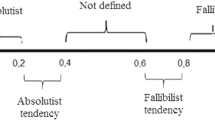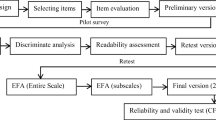Abstract
This qualitative research addresses the gap of studying the relationship between beliefs about assessment in mathematics and mathematics beliefs by identifying the (espoused) beliefs about assessment and their connections with the mathematical beliefs of 18 high school Mexican out-of-field mathematics teachers (i.e. teachers without formal training for teaching mathematics). Thematic analysis was used to analyze data gathered through semi-structured interviews. Results revealed that teachers’ beliefs are organized in different clusters that connect their beliefs about mathematics and assessment in mathematics. Some specific mathematical beliefs and beliefs on assessment played a central role on the construction of these clusters (e.g. ‘mathematics is for applications’). There are two complementary reasons for the existence of these beliefs: the daily context of the participants and their condition of being out-the-field teachers with vocational training as engineers.




Similar content being viewed by others
References
Barnes, N., Fives, H., & Dacey, C. M. (2014). Teachers’ beliefs about assessment. In H. Fives & M. Gregoire (Eds.), International handbook of research on teachers’ beliefs (pp. 284–300). New York, NY: Routledge.
Beswick, K. (2006a). Implications of complexity for the study of belief systems. Proceedings of the British Society for Research into Learning Mathematics, 26(3), 1-6.
Beswick, K. (2006b). The importance of mathematics teachers’ beliefs. Australian Mathematics Teacher, 62(4), 17–22.
Beswick, K. (2007). Teachers’ beliefs that matter in secondary mathematics classrooms. Educational Studies in Mathematics, 65(1), 95–120. https://doi.org/10.1007/s10649-006-9035-3.
Beswick, K. (2012). Teachers’ beliefs about school mathematics and mathematicians’ mathematics and their relationship to practice. Educational Studies in Mathematics, 79(1), 127-147. https://doi.org/10.1007/s10649-011-9333-2
Black, P., & Wiliam, D. (2006). Assessment and classroom learning assessment and classroom learning. Assessment in Education. Principles, Policy & Practice, 5(1), 37–41. https://doi.org/10.1080/0969595980050102.
Black, P., & Wiliam, D. (2009). Developing the theory of formative assessment. Educational Assessment, Evaluation and Accountability, 21(1), 5–31. https://doi.org/10.1007/s11092-008-9068-5.
Bosse, M., & Törner, G. (2015). Teacher identity as a theoretical framework for researching out-of-field teaching mathematics teachers. In C. Bernack-Schüler, R. Erens, T. Leuders, & A. Eichler (Eds.), Views and beliefs in mathematics education (pp. 1–13). Wiesbaden, Germany: Springer. https://doi.org/10.1007/978-3-658-09614-4.
Braun, V., & Clarke, V. (2006). Using thematic analysis in psychology. Qualitative Research in Psychology, 3(2), 77–101. https://doi.org/10.1191/1478088706qp063oa.
Braun, V., & Clarke, V. (2012). Thematic analysis. In H. Cooper (Ed.), APA handbook of research methods in psychology (Vol. 2, pp. 57–71). Washington, DC: American Psychological Association. https://doi.org/10.1037/13620-004.
Brown, G. T. L. (2004). Teachers’ conceptions of assessment: Implications for policy and professional development. Assessment in Education: Principles, Policy & Practice, 11(3), 301–318.
Brown, G. T. L. (2008). Conceptions of assessment: Understanding what assessment means to teachers and students. New York, NY: Nova Science Publishers.
Cross, D. I. (2009). Alignment, cohesion, and change: Examining mathematics teachers’ belief structures and their influence on instructional practices. Journal of Mathematics Teacher Education, 12(5), 325–346. https://doi.org/10.1007/s10857-009-9120-5.
Ernest, P. (1989). The impact of beliefs on the teaching of mathematics. In P. Ernest (Ed.), Mathematics teaching: The state of the art (pp. 249–254). New York, NY: Falmer.
Fives, H., Lacatena, N. & Gerard, L. (2014). Teachers’ beliefs about teaching (and learning). In H. Fives & M. G. Gill (Eds.), International handbook of research on teachers’ beliefs (pp. 249–265). New York, NY: Routledge.https://doi.org/10.4324/9780203108437.ch14.
Furinghetti, F., & Pehkonen, E. (2003). Rethinking characterizations of beliefs. In G. C. Leder, E. Pehkonen, & G. Törner (Eds.), Beliefs: A hidden variable in mathematics education? (pp. 39–57). Dordrech, The Netherlands: Kluwer.
Green, T. F. (1971). The activities of teaching. New York, NY: McGraw-Hill.
Grigutsch, S., Raatz, U., & Törner, G. (1998). Einstellungen gegenüber Mathematik bei Mathematiklehrern [Attitudes towards mathematics in mathematics teachers]. Journal Fur Mathematik-Didaktik, 19(1), 3–45. https://doi.org/10.1007/BF03338859.
Harris, L. R., & Brown, G. T. L. (2009). The complexity of teachers’ conceptions of assessment: Tensions between the needs of schools and students. Assessment in Education: Principles, Policy & Practice, 16(3), 365–381. https://doi.org/10.1080/09695940903319745.
Iannone, P., & Simpson, A. (2016). University students’ perceptions of summative assessment: The role of context. Journal of Further and Higher Education, 41(6), 785-801. https://doi.org/10.1080/0309877X.2016.1177172.
Kaasila, R. (2007). Using narrative inquiry for investigating the becoming of a mathematics teacher. ZDM-The International Journal on Mathematics Education, 39(3), 205–213. https://doi.org/10.1007/s11858-007-0023-6.
Liljedahl, P. (2009). Teachers’ insights into the relationship between beliefs and practice. In J. Maasz & W. Schlöglmann (Eds.), Beliefs and attitudes in mathematics education: New research results (pp. 44–54). Rotterdam, The Netherlands: Sense Publishers.
Maasz, J., & Schlöglmann, W. (Eds.). (2009). Beliefs and attitudes in mathematics education. New Research Results. Rotterdam, The Netherlands: Sense Publishers.
Niss, M. (1993). Assessment in mathematics education and its effects: An introduction. In M. Niss (Ed.), Investigations into assessment in mathematics education (pp. 1–30). Dordrecht, The Netherlands: Kluwer.
Olafson, L., Grandy, C. S., & Owens, M. C. (2014). Qualitative approaches to studying teachers’ beliefs. In H. Fives & M. G. Gill (Eds.), International handbook of research on teachers’ beliefs (pp. 128–149). New York, NY: Routledge.
Pajares, M. F. (1992). Teachers’ beliefs and educational research: Cleaning up a messy construct. Review of Educational Research, 62(3), 307–332. https://doi.org/10.3102/00346543062003307.
Philipp, R. A. (2007). Mathematics teachers’ beliefs and affect. In F. Lester (Ed.), Handbook of research on mathematics teaching and learning (pp. 257–315). Charlotte, NC: Information Age Publishing.
Raymond, A. M. (1997). Inconsistency between a beginning elementary school teacher’s mathe- matics beliefs and teaching practice. Journal for Research in Mathematics Education, 28(5), 550–576.
Richardson, V. (1996). The role of attitudes and beliefs in learning to teach. In J. Sikula (Ed.), Handbook of research on teacher education (pp. 102–119). New York, NY: Macmillan.
Schoenfeld, A. H. (1998). Toward a theory of teaching-in-context. Issues in Education, 4(1), 1–94.
Schueler, S., Roesken-Winter, B., Weißenrieder, J., Lambert, A., & Römer, M. (2015). Characteristics of out-of-field teaching: Teacher beliefs and competencies. In K. Kraine & N. Vondrová (Eds.), Proceedings of the ninth congress of the European Society for Research in mathematics education (pp. 3254–3261). Prague, Czech Republic: Charles University in Prague, Faculty of Education and ERME.
Skott, J. (2015). The promises, problems, and prospects of research on teachers’ beliefs. In H. Fives & M. G. Gill (Eds.), International handbook of research on teachers’ beliefs (pp. 13–30). New York, NY: Routledge.
Stipek, D. J., Givvin, K. B., Salmon, J. M. & MacGyvers, V. L. (2001). Teachers’ beliefs and practices related to mathematics instruction. Teaching and Teacher Education, 17(2), 213–226. https://doi.org/10.1016/S0742-051X(00)00052-4
Suurtamm, C., & Koch, M. J. (2014). Navigating dilemmas in transforming assessment practices: Experiences of mathematics teachers in Ontario, Canada. Educational Assessment, Evaluation and Accountability, 26(3), 263–287. https://doi.org/10.1007/s11092-014-9195-0.
Suurtamm, C., Thompson, D. R., Kim, R. Y., Moreno, L. D., Sayac, N., Schukajlow, S., . . . Vos, P. (2016). Assessment in mathematics education. Berlin, Germany: Springer. https://doi.org/10.1007/978-3-319-32394-7.
Thompson, A. (1992). Teachers’ beliefs and conceptions: A synthesis of the research. In D. A. Grouws (Ed.), Handbook of research on mathematics teaching and learning (pp. 127–146). New York, NY: Macmillan.
Törner, G., & Grigutsch, S. (1994). “Mathematische Weltbilder” bei Studienanfängern—eine Erhebung [“Mathematical World Pictures” in freshmen—A survey]. Journal für Mathematik-Didaktik, 15(3), 211–251.
Žalská, J. (2012). Mathematics teachers’ mathematical beliefs: A comprehensive review of international research. Scientia in Educatione, 3(1), 45–65.
Author information
Authors and Affiliations
Corresponding author
Rights and permissions
About this article
Cite this article
Martínez-Sierra, G., García-García, J., Valle-Zequeida, M. et al. High School Mathematics Teachers’ Beliefs About Assessment in Mathematics and the Connections to Their Mathematical Beliefs. Int J of Sci and Math Educ 18, 485–507 (2020). https://doi.org/10.1007/s10763-019-09967-2
Received:
Accepted:
Published:
Issue Date:
DOI: https://doi.org/10.1007/s10763-019-09967-2




